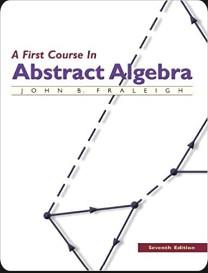Give a one- or two-sentence synopsis of the only if part of Theorem 27.25. Data from 27.25
Question:
Give a one- or two-sentence synopsis of the "only if" part of Theorem 27.25.
Data from 27.25 Theorem
An ideal (p(x)} ≠ {0} of F[x] is maximal if and only if p(x) is irreducible over F.
Proof: Suppose that (p(x)} ≠ {0} is a maximal ideal of F[x]. Then (p(x)} ≠ F[x], so p(x) ∈ F. Let p(x) = f(x)g(x) be a factorization of p(x) in F[x]. Since (p(x)} is a maximal ideal and hence also a prime ideal, (f(x)g(x)) ∈ (p(x)} implies that f(x) ∈ (p(x) or g(x) ∈ (p(x)}; that is, either f(x) or g(x) has p(x) as a factor. But then we can't have the degrees of both f(x) and g(x) less than the degree of p(x ). This shows that p(x) is irreducible over F.
Conversely, if p(x) is irreducible over F, suppose that N is an ideal such that (p(x)} ⊆ N ⊆ F[x]. Now N is a principal ideal by Theorem 27.24, so N = (g(x)} for some g(x) ∈ N. Then p(x) ∈ N implies that p(x) = g(x)q(x) for some q(x) ∈ F[x].But p(x) is irreducible, which implies that either g(x) or q(x) is of degree 0. If g(x) is of degree 0, that is, a nonzero constant in F, then g(x) is a unit in F[x], so (g(x)} = N = F[x]. If q(x) is of degree 0, then q(x) = c, where c ∈ F, and g(x) = (1/c)p(x) is in (p(x)}, so N = (p(x)}. Thus (p(x)} ⊂ N ⊂ F[x] is impossible, so (p(x)} is maximal.
Step by Step Answer:






